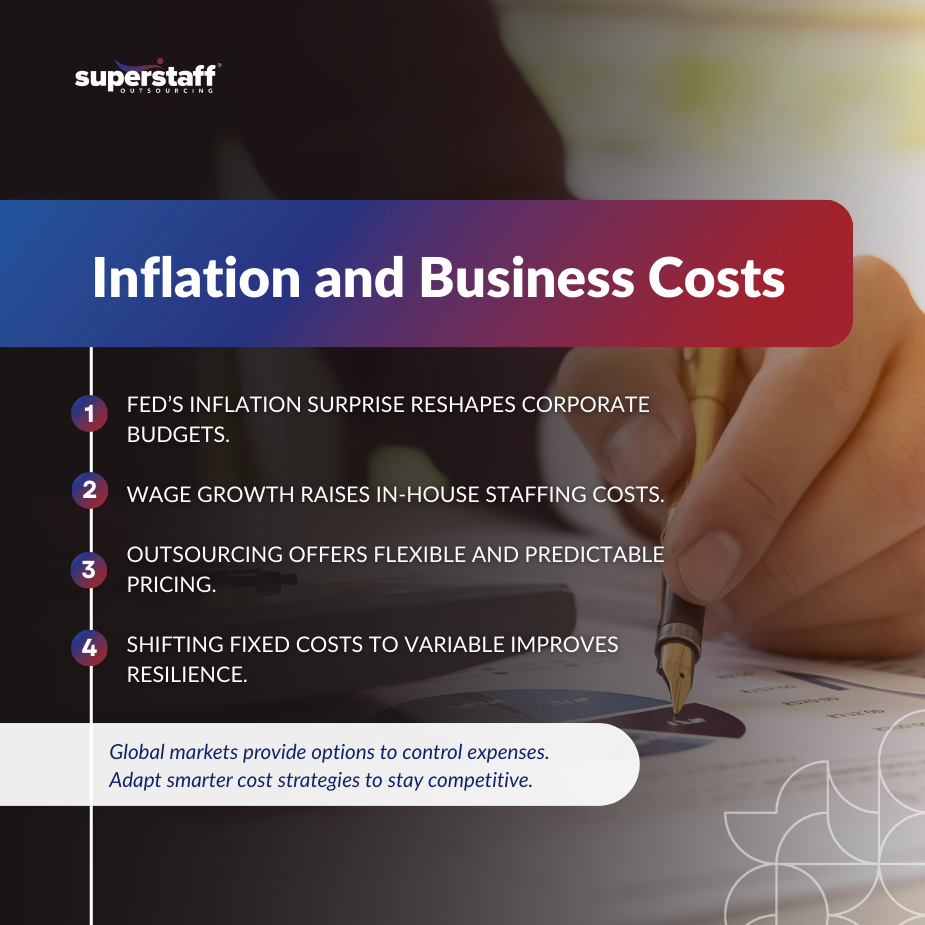
The recent inflation surprise from the Federal Reserve is forcing business leaders to take a closer look at how they manage their expenses. Price volatility affects not only consumers but also how companies plan budgets, allocate resources, and make investment decisions. The impact of inflation on business is becoming increasingly visible as traditional cost structures face new pressures. Companies can no longer assume that overhead-heavy models will remain sustainable in this economic climate.
Rising labor expenses, higher borrowing costs, and unstable supply chains are placing greater demands on executives to rethink strategies. Outsourcing, flexible staffing, and updated contract terms are gaining importance as organizations search for stability. The following sections examine the impact of inflation on business, why cost centers must be managed differently, and which approaches can help companies remain resilient.

The Impact of Inflation on Business
Inflation affects every layer of business operations, from workforce planning to vendor management. Companies that adjust quickly to these pressures are better positioned to maintain stability.
1. Labor and Wage Pressures
As salaries increase, the cost of maintaining large in-house teams grows heavier. Businesses competing for talent must stretch budgets further, leading to tighter margins. Outsourcing provides an alternative path, giving companies access to talent pools where labor costs are more stable.
2. Higher Borrowing Costs
The Fed’s measures to control inflation have led to increased interest rates. This raises the cost of financing expansion projects and makes executives more cautious about taking on debt. Cost centers that were once manageable may now become financial risks without proper oversight.
3. Supply Chain Instability
Unstable supply chains mean that the prices of raw materials and logistics services fluctuate more often. Procurement teams must dedicate more time to securing reliable contracts. Many organizations are now diversifying suppliers and looking at outsourcing arrangements that spread risk across multiple markets.
4. Operational Budget Pressure
Departments such as HR, IT, and facilities require higher budgets as inflation continues. These rising fixed expenses reduce financial flexibility. Some businesses turn to outsourcing solutions for inflation cost management, which transform fixed costs into variable ones.
5. Vendor Pricing Adjustments
Vendors often add inflation clauses to their contracts. Businesses tied to long-term agreements may suddenly face price increases. The impact of inflation on business becomes clear when contract terms fail to provide stability. Regular reviews and renegotiations are becoming a standard practice.
Why Businesses Must Rethink Cost Centers
The structure of cost centers must evolve in response to inflation. Maintaining traditional models puts unnecessary strain on financial planning.
1. Traditional Cost Structures
HR, IT, and administrative departments are often managed in-house, which creates a base of fixed expenses. Inflation magnifies these costs, leaving little room for flexibility when markets shift.
2. Outsourcing as a Flexible Option
Outsourcing provides companies with scalable alternatives to in-house teams. Philippine outsourcing has become especially attractive, combining affordability with a skilled workforce. This approach helps businesses reduce exposure to rising local wages.
3. Contract and Vendor Adjustments
Procurement leaders are now reviewing contracts more closely. Terms that account for inflation and market volatility are essential. Outsourced providers often offer more predictable pricing than in-house models, which allows for steadier budgeting.
4. Balancing Efficiency With Continuity
Businesses cannot simply focus on reducing costs. Operations must continue smoothly during periods of economic stress. Outsourcing ensures that functions such as support, IT, and customer service remain efficient even when internal budgets are tight.
5. Moving From Fixed to Variable Models
The impact of inflation on business highlights the advantage of turning fixed costs into variable ones. By outsourcing certain functions, organizations gain the flexibility to expand or contract as needed without the burden of permanent overhead.
Comparing In-House and Outsourced Approaches
Companies must carefully weigh the differences between in-house and outsourced models to understand where efficiencies can be gained.
1. In-House Workforce Challenges
Rising wages and benefits reduce cost efficiency. Inflation makes it harder to retain skilled workers without stretching payroll budgets.
2. Outsourcing Benefits
Outsourcing offers access to global talent at lower costs. Philippine outsourcing stands out due to its strong English proficiency and competitive rates. This allows companies to maintain output quality while reducing payroll strain.
3. Cost Predictability
In-house costs shift constantly with wage increases and benefits, while outsourcing contracts often provide stable monthly fees. This predictability makes it easier for organizations to plan ahead.
4. Specialized Skill Access
Outsourced providers bring expertise in areas such as IT, HR, and finance. Companies do not need to hire costly in-house specialists. The result is a leaner operation without sacrificing quality.
5. Risk Diversification
By outsourcing, businesses spread operational risks across different providers and regions. This prevents them from being tied too closely to local market conditions that may be disrupted by inflation.
Strategies to Reduce Operational Costs
A clear strategy is required to keep expenses under control while ensuring that operations remain productive.
1. Renegotiate Contracts
Businesses should regularly review vendor agreements and ensure that pricing structures are transparent. Inflation-adjustment clauses help prevent sudden cost spikes.
2. Leverage Outsourcing Models
Organizations are increasingly using outsourcing as a way to handle support functions. Outsourcing solutions for inflation cost management allow companies to maintain quality while staying within budget.
3. Automate Where Possible
Digital tools help streamline repetitive work, which reduces dependence on expensive in-house staff. This creates efficiency while lowering overall expenses.
4. Reevaluate Staffing Needs
Companies benefit from smaller in-house teams focused on strategic roles while expanding their workforce with outsourced support. This balance reduces risk and increases flexibility.
5. Monitor Market Trends
The impact of inflation on business differs across regions. Keeping track of nearshore and offshore pricing allows businesses to adjust quickly and secure better outsourcing terms.
Long-Term Implications of Inflation on Cost Management
The effects of inflation are not short-lived. Companies must prepare for permanent shifts in the way cost centers are structured.
1. Leaner Business Models
Organizations will rely on smaller in-house teams supported by outsourced partners. This reduces overhead while keeping operations stable.
2. Value-Based Outsourcing
Cost management will move beyond simple savings. Businesses will seek outsourcing partners who provide both affordability and specialized knowledge.
3. Flexible Global Operations
Nearshore and offshore outsourcing will continue to play a larger role in maintaining stability. This flexibility ensures resilience across economic cycles.
4. Focus on Core Competencies
By outsourcing support functions, businesses can redirect resources to activities that directly drive growth and revenue.
5. Long-Term Vendor Partnerships
Strong relationships with outsourcing providers ensure predictable costs and consistent performance. These partnerships become valuable in times of financial uncertainty.
Inflation Demands Smarter Business Cost Decisions
The impact of inflation on business is reshaping how companies manage their cost centers. Fixed and overhead-heavy models no longer provide the resilience needed in volatile conditions. Outsourcing creates a flexible and scalable model that helps organizations reduce operational costs while keeping performance steady.
SuperStaff works with companies across industries to restructure cost centers and prepare for the challenges of inflation. With experience in Philippine outsourcing, SuperStaff helps organizations achieve savings while maintaining service quality. By offering tailored outsourcing solutions for inflation cost management, SuperStaff supports businesses in building resilient operations that adapt to changing economic pressures.
Take control of rising expenses with customized outsourcing strategies that strengthen your cost structure. Connect with SuperStaff today to discover how our Philippine-based teams can help your business stay efficient and competitive despite inflation.






